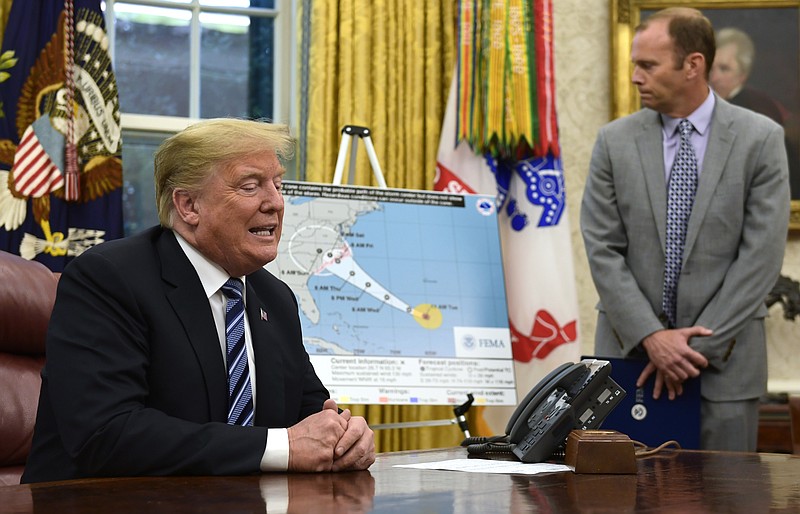WASHINGTON (AP) — As Hurricane Florence bore down on the U.S. Thursday, President Donald Trump churned up the devastating storm of a year earlier, disputing the official death count from Hurricane Maria and falsely accusing Democrats of inflating the Puerto Rican toll to make him “look as bad as possible.”
Public health experts have estimated nearly 3,000 perished because of the effects of Maria. But Trump, whose efforts to help the island territory recover have been persistently criticized, was having none of that. He said just six to 18 people had been reported dead when he visited two weeks after the storm and suggested many had been added later “if a person died for any reason, like old age.”
He said of the Puerto Rico count, “This was done by the Democrats in order to make me look as bad as possible when I was successfully raising Billions of Dollars to help rebuild Puerto Rico.”
Even some Republicans suggested the president had gone too far.
“Casualties don’t make a person look bad,” House Speaker Paul Ryan said, breaking with the president. “So I have no reason to dispute those numbers.”
Sen. Lindsey Graham, of South Carolina, who talks to Trump often, said, “I don’t think it’s bad to say we could have done better in Puerto Rico.” He also said he thought Trump “sees every attack on him as sort of undercutting his legitimacy.”
Especially upset were GOP politicians in Florida, a state with a substantial Puerto Rican population.
Gov. Rick Scott, who is running for the U.S. Senate, tweeted: “I’ve been to Puerto Rico 7 times & saw devastation firsthand. The loss of any life is tragic.” A spokesman for former U.S. Rep. Ron DeSantis, who won the Florida GOP primary for governor with Trump’s support, said the congressman did not agree with Trump’s tweets.
Throughout his presidency, Trump has struggled to publicly express empathy at times of national crises, sparking outrage during his post-Maria visit when he feuded with the San Juan mayor and tossed out paper towels to victims like he was shooting baskets. In recent days, Trump publicly lauded his own administration’s response to Maria — and privately groused over storm-related news coverage he saw as overly focused on Puerto Rico, according to two Republican advisers close to the White House who weren’t authorized to speak publicly.
Puerto Rico’s governor last month raised Maria’s official death toll from 64 to 2,975 after an independent study found the number of people who succumbed in the sweltering aftermath had been severely undercounted.
There are two categories of disaster deaths. “Direct” deaths include such fatalities as drownings in a storm surge or being crushed in a wind-toppled building. “Indirect” deaths are harder to count because they can include such things as heart attacks, electrocutions from downed power lines and failure to receive dialysis because the power is out — and those kinds of fatalities can happen after a storm has ended but while an area still is struggling to restore electricity, clean water and other health and safety services.
When Trump visited in October 2017, two weeks after the storm hit, the death toll at the time was 16 people. The number was later raised to 64, but the government then commissioned an independent study to determine how many died due to post-storm conditions. That study — conducted by the Milken Institute School of Public Health at George Washington University — estimated 2,975 deaths.
In a statement, the institute said it would “stand by the science underlying our study.” It added the study “was carried out with complete independence and freedom from any kind of interference.”
Dr. Carlos Santos-Burgoa — the lead researcher on the study and a well-known expert in global health, particularly Latin America — told the AP the initial figure of 64 deaths reflected only people whose death certificates cited the storm. He said the latest figure was more accurate and stressed every death in the six months following the storm was not attributed to the hurricane.
“We are scientists. We are public health people. We are committed to the health of the population. We try to reach the truth, and we try to understand what is damaging the people in order to prevent disease,” he said.

